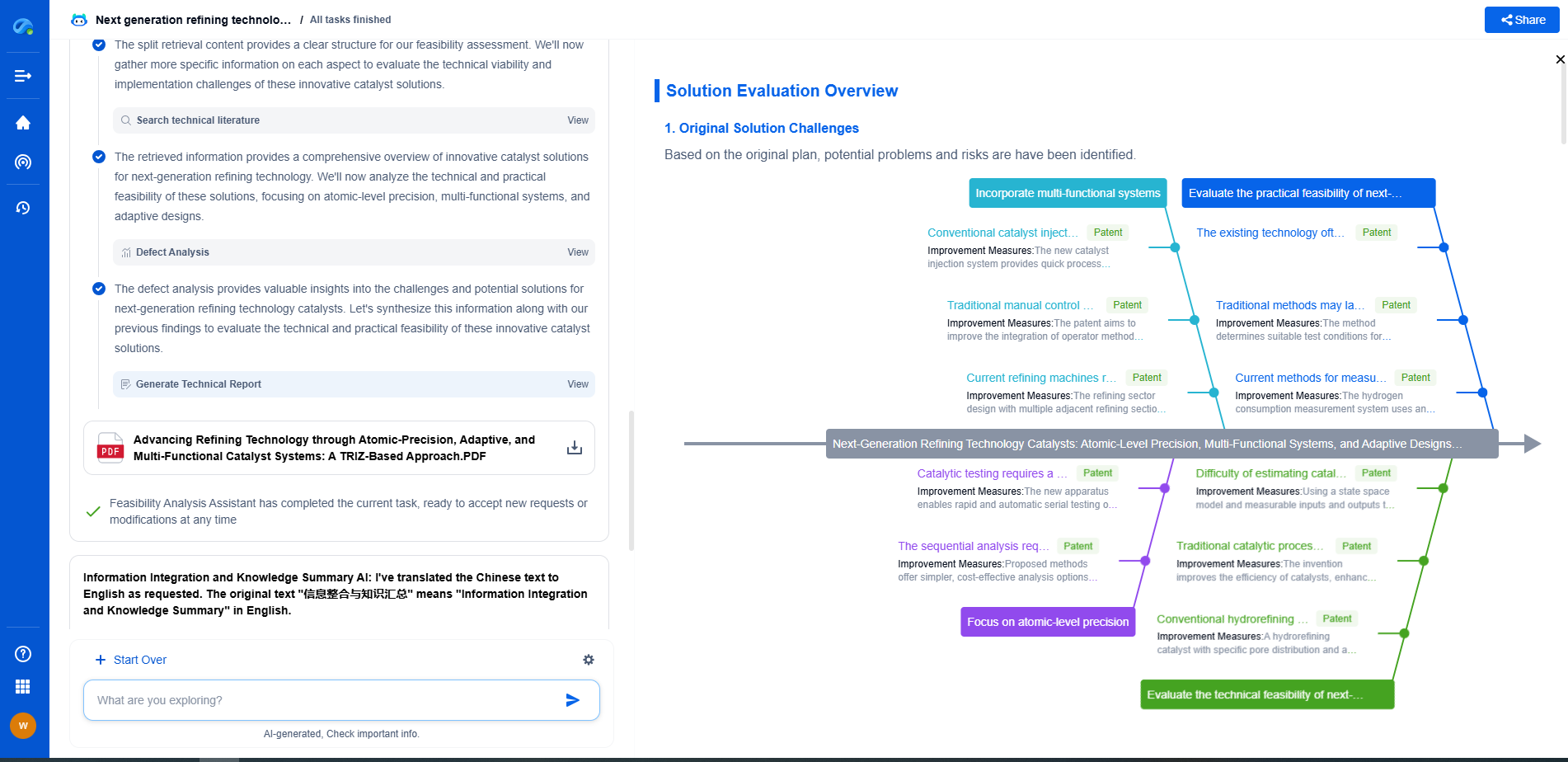What Certifications Are Needed for Batteries Used in Medical Devices?
JUN 20, 2025 |
The medical device industry is one of the most tightly regulated sectors in the world. With patient safety at the forefront, it is crucial that every component of a medical device, including the batteries that power them, meet stringent standards and certifications. Proper certification ensures the reliability, safety, and effectiveness of these devices. Below, we explore the key certifications needed for batteries used in medical devices.
The Role of ISO Standards
ISO (International Organization for Standardization) standards serve as a critical benchmark in the medical device industry. Specifically, ISO 13485 is a widely recognized standard that outlines the requirements for a quality management system in the design and manufacture of medical devices. While it focuses on the overall device, manufacturers of batteries used within these devices must align their processes to these standards to ensure the final product meets regulatory requirements.
ISO 14971 is another important standard focusing on the application of risk management to medical devices. Batteries, as an integral component, must undergo risk assessment to identify potential failures and mitigate them effectively. Both of these ISO standards are fundamental to ensuring the safety and performance of batteries in medical devices.
IEC 62133 for Battery Safety
The International Electrotechnical Commission (IEC) standard 62133 is crucial for rechargeable batteries, particularly lithium-ion and nickel systems. This standard evaluates the safety of batteries by examining their electrical, mechanical, and thermal characteristics. It is essential for ensuring that batteries used in medical devices do not pose risks such as overheating, leakage, or explosion, thereby safeguarding patients and users.
Compliance with IEC 62133 is often mandatory for batteries in medical devices, as it offers a comprehensive framework for testing and verifying the safety of battery cells and packs.
UL Certifications for Product Safety
Underwriters Laboratories (UL) provide another layer of safety assurance with their rigorous testing programs. UL certifications relevant to medical device batteries include UL 1642 for lithium batteries and UL 2054 for household and commercial batteries. These certifications focus on battery safety, emphasizing protection against hazards such as fire and electric shock.
UL standards are recognized globally and often serve as a mark of trust and reliability. Medical device manufacturers and battery suppliers frequently pursue UL certifications to demonstrate their commitment to the highest safety standards.
Transportation and Handling: UN 38.3 Certification
Batteries used in medical devices often require transportation, whether as part of the supply chain or as components in final products shipped internationally. UN 38.3 is a certification that sets out the testing requirements for lithium batteries to ensure safe transportation. This certification is vital to prevent incidents during shipping that could result in damage or hazards to the batteries.
Batteries must undergo rigorous tests under UN 38.3, including altitude simulation, thermal tests, vibration, shock, and external short circuit tests. Meeting these criteria ensures that batteries can withstand the stresses of transportation without compromising safety.
FDA Regulations and Approval
In the United States, the Food and Drug Administration (FDA) regulates medical devices, including the batteries that power them. Batteries intended for use in medical devices may need to be cleared or approved by the FDA, particularly if they are part of a novel device or technology.
Manufacturers must provide evidence that their batteries meet safety and performance standards as part of the FDA's 510(k) premarket notification or the more rigorous Premarket Approval (PMA) process. Compliance with FDA regulations is crucial for market access in the United States and serves as a benchmark for global standards.
The Path to Compliance
Navigating the complex landscape of certifications and regulations can be challenging for battery manufacturers and medical device companies. However, achieving compliance is not only necessary for market access but also ensures the safety and efficacy of medical devices that millions of patients rely on daily.
Collaboration between battery manufacturers, medical device companies, and regulatory bodies is essential. By staying informed about the latest standards, investing in quality manufacturing processes, and prioritizing rigorous testing, manufacturers can meet the necessary certifications and contribute to the advancement of safe and reliable medical technologies.
Final Thoughts
In summary, certifications for batteries used in medical devices are indispensable. They guarantee that the batteries meet the highest standards of safety and performance, crucial for devices that have a direct impact on patient health and safety. Manufacturers must pursue relevant ISO, IEC, and UL standards, ensure compliance with UN transportation regulations, and adhere to FDA requirements to successfully bring their products to market. By doing so, they play a critical role in advancing healthcare technology and ensuring better outcomes for patients worldwide.
Accelerate Breakthroughs in Fuel Cell and Battery Innovation—with the Power of AI
From solid-state battery breakthroughs to high-efficiency hydrogen fuel cells, keeping pace with fast-evolving chemistries, global patent landscapes, and emerging application pathways is an ever-growing challenge for R&D and IP professionals.
Patsnap Eureka, our intelligent AI assistant built for R&D professionals in high-tech sectors, empowers you with real-time expert-level analysis, technology roadmap exploration, and strategic mapping of core patents—all within a seamless, user-friendly interface.
Whether you're optimizing cathode formulations, evaluating electrolyte stability, or navigating the crowded patent space around battery pack design, Eureka empowers you to move faster and with greater confidence.
Start your journey with Patsnap Eureka today—streamline your research, enhance decision-making, and power the future of energy with AI-driven clarity.
- R&D
- Intellectual Property
- Life Sciences
- Materials
- Tech Scout
- Unparalleled Data Quality
- Higher Quality Content
- 60% Fewer Hallucinations
Browse by: Latest US Patents, China's latest patents, Technical Efficacy Thesaurus, Application Domain, Technology Topic, Popular Technical Reports.
© 2025 PatSnap. All rights reserved.Legal|Privacy policy|Modern Slavery Act Transparency Statement|Sitemap|About US| Contact US: help@patsnap.com

